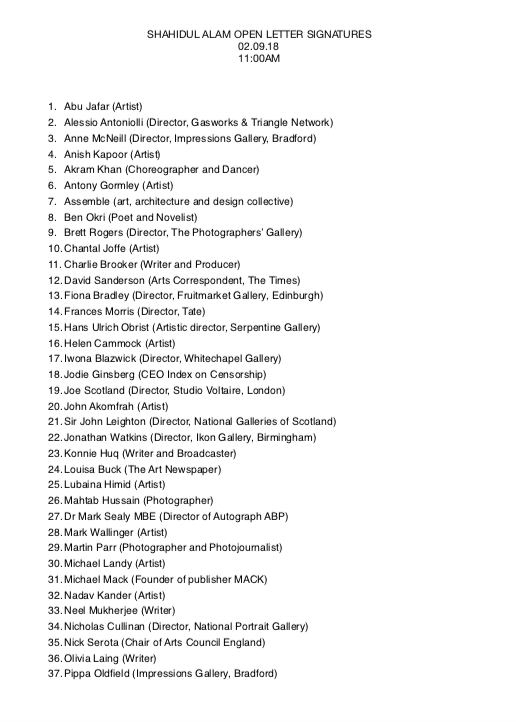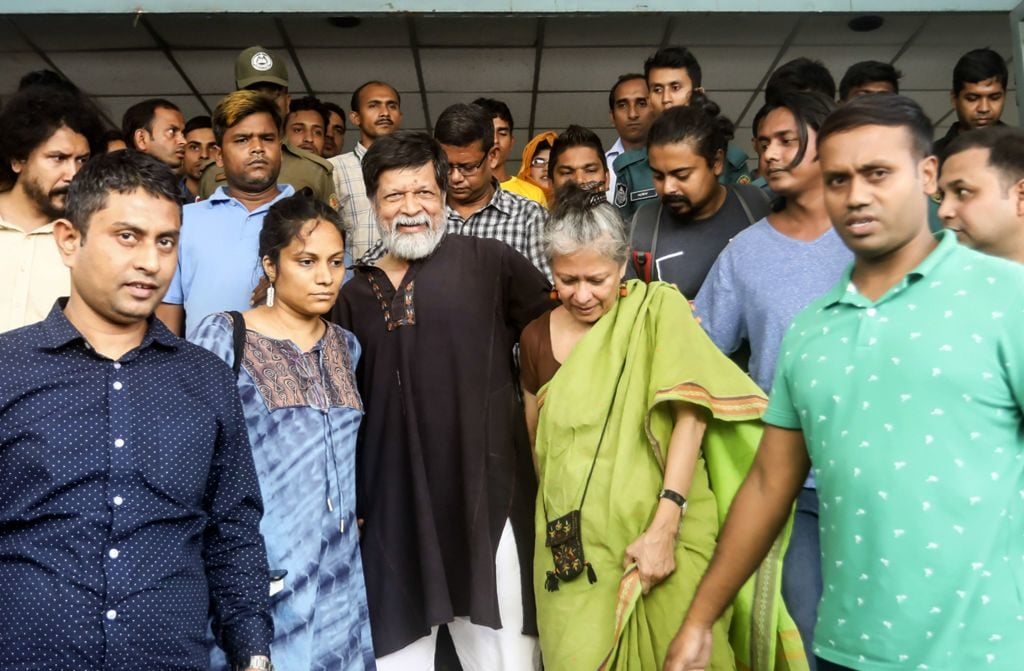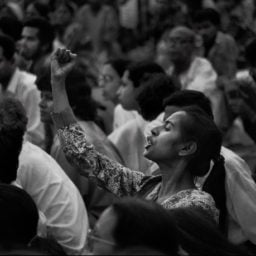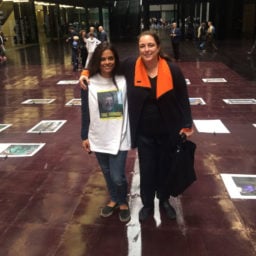A chorus of high-profile British artists, curators, and writers have put their name to the latest statement calling for “the immediate and unconditional release” of Shahidul Alam, the well-known and outspoken photographer who is currently facing imprisonment for criticizing the government in Bangladesh. Within the visual arts, the new letter marks the biggest statement yet in a case that has already attracted the concern of United Nations human rights officials, Nobel Prize winners, celebrities, and the international photojournalism community.
(For background on Alam and the charges against him see: “Why Everyone Should Be Paying Close Attention to the Case of Jailed Bangladeshi Photographer Shahidul Alam.“)
The 49 signatories of the new statement include multiple Turner Prize winners—the Assemble collective, Antony Gormley, Lubaina Himid, Anish Kapoor, Steve McQueen, and Mark Wallinger—as well as several dozen other important artists including John Akomfrah, Chantal Joffe, and Martin Parr.
Also putting their names to the statement are Nicholas Serota, currently the head of Arts Council England; Nicholas Cullinan, director of the National Portrait Gallery; Sarah Munro, head of BALTIC Centre for Contemporary Art; and Serpentine curator Hans Ulrich Obrist. Charlie Brooker, creator of the internationally celebrated Black Mirror, signs as well. The full letter and list of all the signatories is embedded below.
The new letter from artistic supporters was organized by Sofia Karim, a UK-based architect and niece of Alam. She said it was inspired by a similar letter untaken by members of the Indian artistic community.
Karim adds that awareness in the UK about Alam’s case has been growing: “all three British Bangladeshi MP’s gave public statements calling for the release of my uncle.” These include the Labour MP Tulip Siddiq, who happens to be the niece of Sheikh Hasina Wazed, currently head of Bangladesh’s government.
“My uncle taught me peace—that violence indicates a loss of control,” Karim writes to artnet News. “He taught me to only ever treat others as I would wish to be treated. It is wrong to subjugate another human. He also taught me to love my motherland and be proud of my heritage. Bangladesh is a beautiful country of exceptionally resilient people. I have always loved Bangladesh, I always will. We shall overcome.”
Karim adds that the statement will be posted to the FreeShahidul Facebook page, where she hopes it will attract further signatories and support.
Alam was arrested on August 5, after social media posts and an interview with Al Jazeera in which he spoke critically of the government and described the violence he witnessed against student-led protests that had shaken the capital of Dhaka and embarrassed the ruling Awami Party.
In recent days, foes of Alam have not been silent either. Sajeeb Wazed, Bangladesh’s Information & Communications Technology Advisor and the son of Sheikh Hasina, directly addressed the English-language audience in the US, taking to the RealClearPolitics website to argue that Bangladesh was justified in its actions.
“Mr. Alam’s words helped transformed [sic] a peaceful protest into lawless violence,” Wazed writes, comparing Alam’s criticism of the government to shouting “fire” in a movie theater. (For background, the Wire, an independent publication analyzing politics in the region, has analysis of Wazed’s recent comments justifying Alam’s persecution.)
Alam’s case has drawn fresh waves of international scrutiny to the widely condemned Section 57 of Bangladesh’s Information & Communications Act, which the Committee to Protect Journalists has called an “avenue to misuse power.” According to the CPJ, the law means that “anyone convicted of publishing material online deemed to be false, obscene, defamatory, likely to harm law and order, tarnish the image of the state or an individual, offend religious sentiments, or provoke individuals or organizations faces a maximum 14 years in prison and a 10 million Bangladeshi taka (US$120,000) fine.”
In the United States, another relative of Alam’s, New York-based Rabab Ahmed, has also been active speaking out around his case, discussing his case on the BBC last week.
“I think if I had to choose one thing that should be known about this case it is that this man’s human rights are being violated for a simple and innocuous report—an eye-witness report of what was happening around him,” Ahmed told artnet News on Sunday. “They’re trying to make an example out of him, and yet all he was doing is relaying what he and countless others witnessed around him. This is the height of corruption, to violently silence people like him, for reasons like this.”
Vigils are planned for Alam on either side of the Atlantic, next weekend, Saturday, September 7. In London, according to Karim, supporters will gather outside the Bangladesh High Commission from 12 noon until 2 pm. In New York, a vigil calling for respect of Alam’s rights of free speech will take place at Union Square, from 5 pm to 8 pm.
Since his detention, which included alleged torture at the hands of authorities, supporters have expressed grave concerns about Alam’s physically well being. Ahmed mentions that those who have visited the photographer report that he now suffers from pain and difficulty eating solid foods, as well as hallucinations relating to his ordeal.
“The latest I’ve heard is only that apparently he has said that once he is free he would work for prison reform,” Ahmed wrote. “A few days ago his partner Rahnuma [Ahmed] had shared that he looked and sounded better when she went to visit him. Sadly, that is all we know.”
“My uncle is accused of ‘tarnishing the image of the state,'” Karim writes from London. “But it is his and others’ treatment at the hands of the state that tarnishes the image of the state.”
Click below to read the open letter and see the complete list of signatories:











